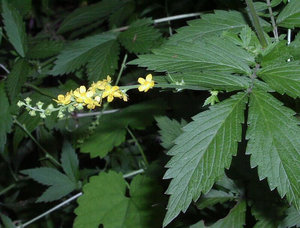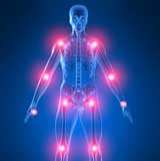
Pinyin: Xian He Cao Latin: Agrimonia Pilosa
Physical Characteristics:
Agrimonia Pilosa or Hairy Agrimony is a perennial growing to 0.6m hardy to zone 0 in flower from June to August, and the seeds ripen from August to September. The flowers are hermaphrodite (have both male and female organs) and are pollinated by Bees, flies. The plant is self-fertile. The plant prefers light (sandy), medium (loamy) and heavy (clay) soils. The plant prefers acid, neutral and basic (alkaline) soils. It can grow in semi-shade (light woodland) or no shade. Agrimonia Pilosa requires dry or moist soil.
Family:
Edible Uses:*
Edible Parts: Leaves; Seed.*
Young leaves - cooked[177]. Seed - dried and ground into a meal[179]. Mixed with noodles[177].*
Traditional Chinese Medicinal (TCM) Uses:*
Agrimonia Pilosa stems and the leaves are analgesic, antibacterial, anti-inflammatory, antipyretic, astringent, cardiotonic, haemostatic, hypoglycaemic, taenicide and vasoconstrictor[147, 176, 218, 279].*
Agrimonia Pilosa plant is used in the treatment of abdominal pain, sore throat, headaches, bloody and mucoid dysentery, bloody and white discharge and heat-stroke[147, 272]. Agrimonia Pilosa is used in Korea to treat parasitic worms, bois and ezema[279].*
Hairy Agrimony leaves are rich in vitamin K and are used to promote blood clotting and control bleeding[238]. The plant contains agrimonin, this is haemostatic, cardiotonic and lowers blood sugar, though it can also produce palpitations and congestion of the blood in the face[176]. The root ia astringent, diuretic and tonic[272].*
Agrimonia Pilosa is used in the treatment of coughs, colds, tuberculosis and diarrhoea[272]. The root juice is used in the treatment of peptic ulcer[272]. A paste of the root is used to treat stomach ache[272]. Plants are harvested as they come into flower and can be dried for later use[238].*
References:
- [147] A Barefoot Doctors Manual. Running Press 0 ISBN 0-914294-92-X
- [176] Yeung. Him-Che.Handbook of Chinese Herbs and Formulas. Institute of Chinese Medicine, Los Angeles 1985
- [177] Kunkel. G.Plants for Human Consumption. Koeltz Scientific Books 1984 ISBN 3874292169
- [179] Reid. B. E.Famine Foods of the Chiu-Huang Pen-ts'ao. Taipei. Southern Materials Centre 1977
- [218] Duke. J. A. and Ayensu. E. S.Medicinal Plants of China Reference Publications, Inc. 1985 ISBN 0-917256-20-4
- [238] Bown. D.Encyclopaedia of Herbs and their Uses. Dorling Kindersley, London. 1995 ISBN 0-7513-020-31
- [244] Phillips. R. & Foy. N.Herbs Pan Books Ltd. London. 1990 ISBN 0-330-30725-8
- [272] Manandhar. N. P.Plants and People of Nepal Timber Press. Oregon. 2002 ISBN 0-88192-527-6
- [279] Medicinal Plants in the Republic of Korea World Health Organisation, Manila 1998 ISBN 92 9061 120 0
Source: Agrimonia Pilosa Plants For A Future, England 1996-2008.
This work is licensed under a Creative Commons License.
Natural dietary supplements are designed to offer the body support to promote health, harmony, balance and overall well being.*

 Get Well Natural, LLC
Get Well Natural, LLC  Kidney Function & Regeneration Health
Kidney Function & Regeneration Health  Platelet & Blood Cell Health
Platelet & Blood Cell Health  Prostate, Flow & Function Health
Prostate, Flow & Function Health  General Mind & Body Health
General Mind & Body Health  Heart, Cholesterol & Cardio Health
Heart, Cholesterol & Cardio Health  Allergy-Free Body
Allergy-Free Body  Anxiety & Stress
Anxiety & Stress  Blood Platelet Counts & Function
Blood Platelet Counts & Function  Blood Pressure Health
Blood Pressure Health  Kidney Function Health
Kidney Function Health  Immune System Health & Balance
Immune System Health & Balance  Prostate & Urinary Health Function
Prostate & Urinary Health Function  Blood Sugar Balance
Blood Sugar Balance  Cardiovascular Heart Health
Cardiovascular Heart Health  Detoxification & Healthy Cells
Detoxification & Healthy Cells  Women's Health
Women's Health  Liver Regeneration
Liver Regeneration  Pain-Free Body
Pain-Free Body  Water & Air Filtration
Water & Air Filtration 


